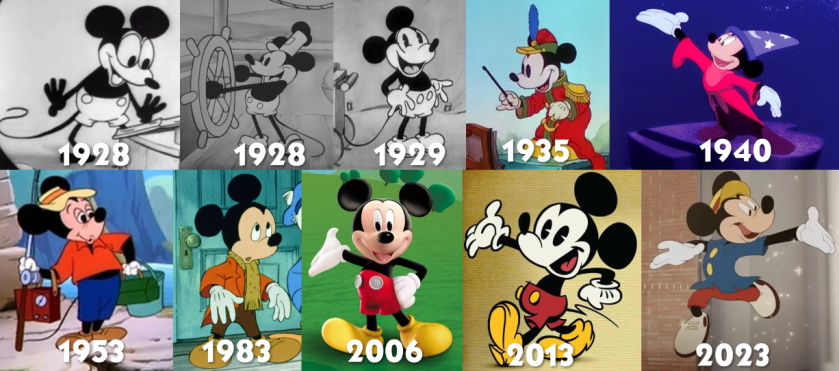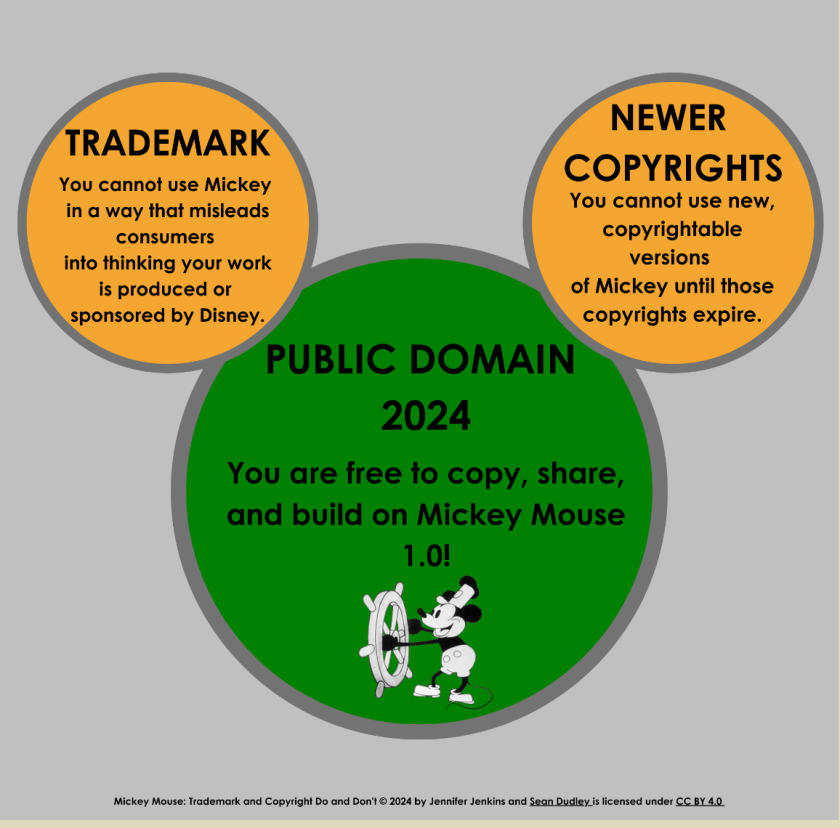The most anticipated entry to the public domain, “Steamboat Willie,” an animated short featuring and early incarnation of Mickey Mouse, became available royalty-free to all on New Year’s Day.
But don’t look to build a business out of that iconic image. Disney still protects Mickey in myriad ways.
On January 1, 2024, after 95 years of copyright protection, Mickey Mouse, or at least an early version of Mickey from the animated cartoon, the first movie in which the iconic mouse appeared in 1928, entered the U.S. public domain.
This is generally regarded as an opportunity for consumers and creators, publishers and producers who may wish to incorporate once protected classics into new works, without having to pay for a license or ask for permission.
Thousands of copyrighted works became public domain this year. Highlights include Lady Chatterley’s Lover by D. H. Lawrence and The Threepenny Opera by Bertolt Brecht, Buster Keaton’s The Cameraman and Cole Porter’s Let’s Do It, and a trove of sound recordings from 1923.
Trademarks are property of the owner, a company or individual, for perpetuity, as long as they are used. Not everyone in the U.S. agrees that copyrights should expire, even after 95 years. Celebrated novelist and essayist Mark Helprin argues that copyrights are property, just like trademarks, real estate and other assets, and creators should have the right to pass them to their heirs and and other descendants.
Helprin believe that looseness with copyright is a reflection of the easy access to digital content and an inflated sense of entitlement. It is highly unlikely that publishers of 2024 public domain books and issuers of sound recordings and images will be doing so for free. Project Gutenberg, a library of digital classics is a notable exception.
Full Access to Limited Content
After expiration, anyone will be able to screen or otherwise use the original Steamboat Willie short without permission from Disney. This version of Mickey and thousands of other works will be free for all to copy, share, and change, without license.

From 1929, Mickey is still protected by copyright
The animated short can now be sold by third parties, although Disney has already made the film free online, so sales will likely be minimal. The film and its characters can also be used by anyone wishing to feature the characters in original stories or artwork.
“Disney can and almost certainly will still be very protective of the Mickey Mouse character, as it still owns the trademark.”
“Disney can and almost certainly will still be very protective of the Mickey Mouse character,” reports Cartoon Brew, “as it still owns the trademark.” A trademark can be renewed indefinitely and is meant to prevent marketplace confusion. The company also owns many copyrights on more recent incarnations of Mickie.
Any public-domain use of the Steamboat Willie characters cannot be perceived as coming from Disney, the trademark holder. Where there is a possibility of confusion — that consumers could assume that Disney is behind the use, expect the company to act. An excellent article about the Mickie copyright saga appears on Duke’s Center for the Study of the Public Domain website.
Over the decades Disney and other large copyright holders, like film studios and record labels have successfully lobbied the U.S. Congress for the extension of copyright protection. Like trademarks, trade secrets never expire, but patents on inventions do 20 years after filing, a period some believe is too long.

Some of the works that became public domain in 2024:
- D.H Lawrence, Lady Chatterley’s Lover
- Bertolt Brecht, The Threepenny Opera (in the original German, Die Dreigroschenoper)
- W.E.B. Du Bois, Dark Princess
- Agatha Christie, The Mystery of the Blue Train
- Ben Hecht and Charles MacArthur, The Front Page
- Animal Crackers (musical starring the Marx Brothers; book by George S. Kaufman and Morrie Ryskind and lyrics and music by Bert Kalmar and Harry Ruby)
- Mack the Knife (original German lyrics by Bertolt Brecht and music by Kurt Weill; from The Threepenny Opera)
- Let’s Do It (Let’s Fall in Love) (Cole Porter; from the musical Paris)
- When You’re Smiling (lyrics by Mark Fisher and Joe Goodwin and music by Larry Shay)
- Makin’ Whoopee! (lyrics by Gus Khan and music by Walter Donaldson)
- I Can’t Give You Anything But Love, Baby (lyrics by Dorothy Fields and music by James Francis)
- Yes! We Have No Bananas (recorded by Billy Jones; Furman and Nash; Eddie Cantor; Belle Baker; The Lanin Orchestra)
- Who’s Sorry Now (recorded by Lewis James; The Happy Six; the Original Memphis Five)
- Down Hearted Blues (recorded by Bessie Smith; Tennessee Ten)
Image source: cartoonbrew.com; web.law.duke.edu

